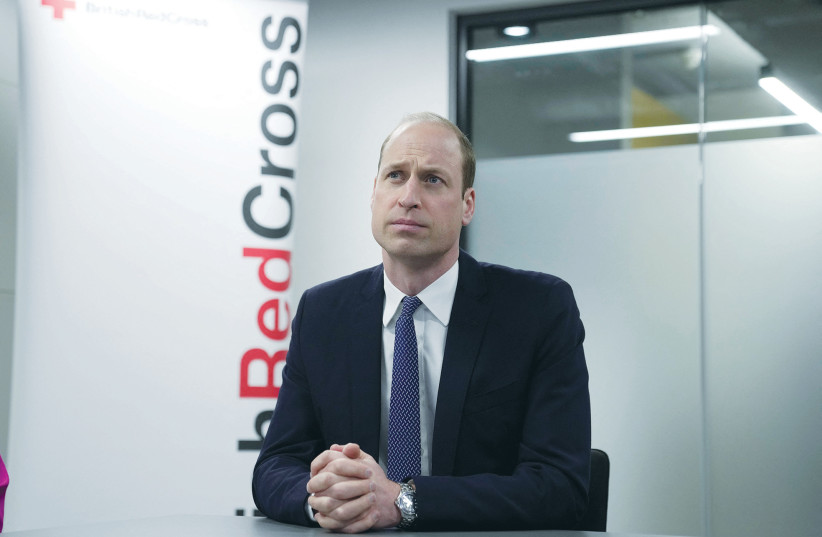While scrolling through my social media feed, I came across a curious item issued by KensingtonRoyal, the X/Twitter account of the Prince and Princess of Wales. It followed a statement by the prince sharing his thoughts on the Israel-Hamas war. It was a post detailing his recent visit to the UK headquarters of the British Red Cross, along with the following:
“Understanding how the @BritishRedCross is providing vital humanitarian aid to those affected by the conflict in the Middle East. Staff and volunteers continue to work day and night to bring life-saving assistance and medical treatment to those who need it most.”
The Prince of Wales’ visit to the British Red Cross came on the same day as a statement made by His Royal Highness, giving his perspective on the Israel-Hamas war. While the future heir to the throne is free to privately express his concerns, I believe that in the wake of October 7, Prince William’s decision to support the Red Cross was a gross misjudgment.
Let’s be crystal clear: The International Red Cross has failed Israel and the Jews. Following the October 7 massacre, they did not see a single hostage, they refused to verify if life-saving medicine was delivered to the hostages, and they could not obtain any proof of life.

There are still 132 hostages held by Hamas in Gaza and the International Red Cross has done nothing for them. They were silent for months about their plight and only tweeted about them on the 1st of February. That’s nearly four months since the hostages were brutally kidnapped from their homes in Southern Israel on October 7.
Just one week ago, in this very newspaper, an article was published with the title “Is the Red Cross really neutral on Israel?” As the article accurately portrays, this failure brings to mind another historic failure of the International Red Cross – when they failed to condemn the Holocaust, choosing not to launch an appeal in 1942 on the plight of European Jewry.
As Judith Sudilovsky writes: “For a large majority of Israelis – with the ICRC’s [International Committee of the Red Cross’s] failure during the Holocaust to do anything on behalf of Jews in concentration camps still fresh in their memories – the terms ‘trusted middleman’ and ‘neutral intermediary’ are ridiculed, and they accuse the ICRC of doing virtually little to nothing to secure the release of the hostages in Hamas’s hands, ascertain their whereabouts, let alone visit them or ensure that they had received medicines sent in an agreement mediated by Qatar in mid-January.”
IN THE ARTICLE, Eviatar Manor, Israeli ambassador to Geneva from 2012-2016, argues beyond their failures; what struck him was their lack of empathy. “I am not surprised by their inability to reach the hostages to see what state they are in, or [to] go bring them medicine,” he writes. “I am, however, disappointed with the lack of empathy shown by the ICRC, both by the main office in Geneva and the office here. I think they could have shown more empathy in their statements also to the suffering of Israel. It is not just the hostages; it is also the displaced Israelis.”
It is true that the Prince of Wales visited the British Red Cross specifically. However, it would be naive to ignore the impression that his visit gives the global Red Cross a kind of royal warrant.
Listening to the Jewish community
So what is the lesson from this? Prince William’s team must listen to the Jewish community. The criticism of the Red Cross has been loud and clear. In response to the epic failure of the International Red Cross, protests were held in Israel and in other places. Signs were held that proclaimed “Shame on the Red Cross.”
Meanwhile, a 136-hour hunger strike will take place on the campus of the United Nations and the International Committee of the Red Cross to protest their abandonment of the hostages. All of this is being reported in the Jewish press, and is being discussed in conversations on public platforms, such as X.
It is not too much to expect a high-profile individual such as Prince William to be in full possession of the facts before wading into a conflict as divisive as this. Supporting the Jewish community goes beyond his upcoming visit to synagogue where he will be feted and exalted. Ally-ship is about listening – really listening. And all of this information, all of these conversations were there: If only Prince Williams’ team had paid attention.
As a monarchist, I felt a sense of betrayal with this royal visit. In my opinion, legitimizing the Red Cross at this time – any Red Cross – sends a message to the Jews in the UK and around the world that our experiences do not matter, and that organizations tasked with protecting us are allowed to fail us without any consequences. Worse still, they will continue to be praised in spite of their continued failures. Such missteps are unacceptable and need to be understood as such by the prince, his advisers and his communications team.
The writer is founder of the modern Jewish Pride movement, an educator, and the author of Jewish Pride: Rebuilding a People. His new book is Reclaiming Our Story: The Pursuit of Jewish Pride.
